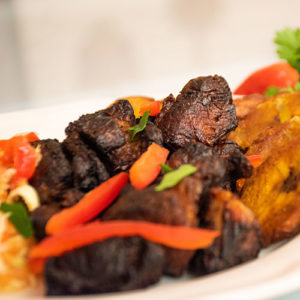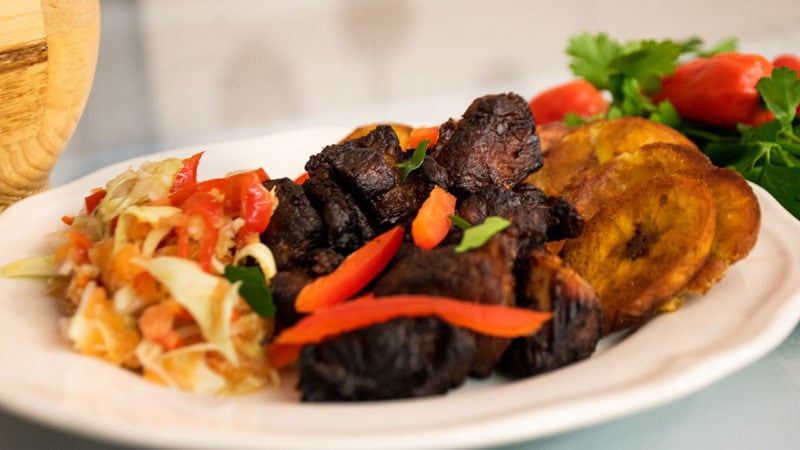Last Updated on February 2, 2022
Vegans and vegetarians: Avert your eyes. Carnivores, picture the scene: A delicious spread with copious amounts of well-seasoned fried pork shoulder and fermented spicy cabbage.
The unctuously seasoned fried pork served with pickled cabbage and carrots made with spicy Scotch bonnet peppers are known as griot and pikliz. They’re often part of a fritay, a variety of fried spicy foods, and a common street food snack that most Haitians know and enjoy.
As the daughter of parents who emigrated to the United States in the late 70s, fritay was reserved for parties and special occasions. As a kid, fritay meant company after Sunday church services and welcoming distant cousins and family members visiting from Haiti. Fritay always felt like joy in every bite.
My mom and eldest sister taught me how to cook Haitian dishes that I have come to love and enjoy. And as a food writer, I love nothing more than to share my cultural heritage with others through food. Some background: The term griot has French origins which refer to African poets and storytellers—keepers of oral tradition. As the first Black republic to establish its independence from colonial rule and slavery—during the Haitian revolution fought and won in 1804—Haiti has a rich history, as told through all parts of our culture—including our food culture.
Griot gets its signature flavor from the citrus and spices in its marinade. Ideally, you
should let it marinate overnight for a punchy kick. For the most authentic taste, always “wash” your pork in lime and sour orange juices. Marinate your meat in epis, a mix of aromatics made with Haitiain herbs and vegetables like scallions, garlic, salt, parsley, and onions.
The best way to enjoy griot and pikliz? With family, friends, and good stories.
For Black History Month, ButcherBox is celebrating Black foodways and sharing our favorite recipes from Black authors. Click Here To Learn More.

Ingredients
For the Griot
- 3 pounds (1.5 kg) pork shoulder cubed
- Salt to taste
- 1/2 teaspoon freshly cracked pepper plus more to taste
- 1 onion chopped
- 2 shallots chopped
- 4 scallions chopped
- 1 bell pepper sliced
- 4 cloves garlic divided
- 1 cube chicken bouillon optional
- 2 oranges juiced
- 2 limes juiced
- 1 tablespoon white wine vinegar
- 10 sprigs fresh thyme
- 1/2 bunch fresh parsley
- 1 Scotch bonnet pepper sliced
- 1 cups (480 ml) cups water
- 4 cups (1 liter) oil for frying
- 3 fried plantains to serve
For the pikliz
- 2 cups (200 g) cabbage shredded
- 1 cup grated carrot (about 2 medium carrots)
- 1 bell pepper sliced (optional)
- 1 medium onion sliced (about 1/2 cup)
- 3 scallions thinly sliced
- 1 shallot sliced
- Salt to taste
- Black pepper to taste
- 1 Scotch bonnet pepper divided
- 2 cups (480 mL) white wine vinegar
Instructions
For the pikliz
- Combine the shredded cabbage, grated carrot, 1 sliced bell pepper, onion, scallions, 1 sliced shallot, and 2 sliced Scotch bonnets in a large bowl. Add the salt and freshly cracked black pepper.
- Wearing gloves, mix using your hands. Pack the pikliz down into sterilized Mason jars. Put on the lid and refrigerate for at least 12 hours to marinate.
For the griot
- Combine the cubed pork shoulder, salt, pepper, onion, shallots, scallions, sliced bell pepper, sliced garlic cloves, orange juice, lime juice, white wine vinegar, thyme sprigs, parsley, and the sliced Scotch bonnet peppers to a large Dutch oven (off the heat).
- With gloves on, mix the mixture thoroughly. Cover the pot and place in the refrigerator to marinate overnight.
- Place the deep pot with the marinated pork on the stove. Add the water and bring to a boil. Transfer the pork to the oven to braise for 1 1/2 hours or until cooked through and tender.
- Remove from oven and cool. When the pork is cool enough to handle, remove pork from liquid and place on a paper towel-lined tray to dry. Pat down the surface of the pork to make sure there is no moisture.
- Heat the oil in a large pot to 350°F (180°C). Add the pork in batches and fry until deep golden brown color, about 5-7 minutes. Transfer the pork to a paper towel-lined plate to drain.
- Serve with fried plantains and the pikliz.
Photo credit: Jeanne Pasquet
Margo Gabriel is a freelance writer and cookbook editor from Boston, MA. She is based in Lisbon, Portugal. Her writing has been published in Boston Art Review, Cuisine Noir, Edible Boston, Fodor’s, We Are Indy, Popsugar and Solstice Literary Magazine. You can follow her work at www.margoscreativelife.com.



